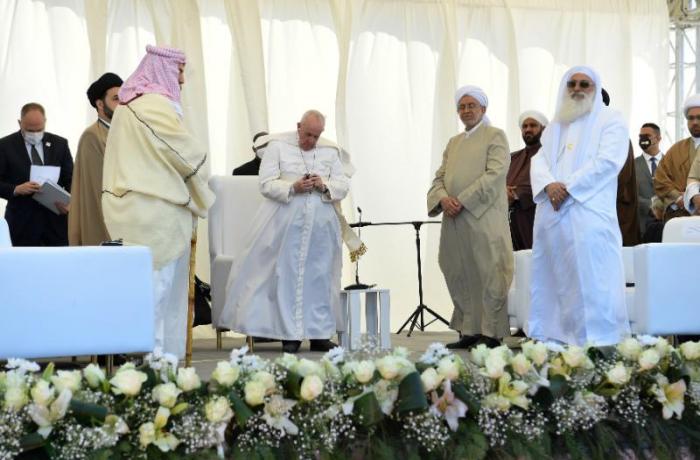Saad Salloum notes that al-Sistani’s Islam is “different from that in Qom” and is “open to other religions”. In his view, “The roots of the Iraqi tree are Christian.” Iranian scholar says that Al-Sistani is a “good choice” to convey a “message of peace” to the Islamic world. Even in Israel the balance with the Muslim world is changing, says pacifist rabbi.
This article was published by ASIANEWS.IT on 03/06/2021 at – : http://bit.ly/3sWcXg8

Baghdad (AsiaNews) – The meeting between Pope Francis and Grand Ayatollah Ali al-Sistani in Najaf and the interfaith prayer in Ur of the Chaldeans are laying the foundations for an Iraq based on coexistence, pluralism, peace and a multicultural vision.
Analysts and commentators, from Iran to Israel, stress the “historic” significance of this morning’s meeting between the pontiff and the Shia spiritual leader and the dialogue between different faiths in the birthplace of Abraham, father of the three great monotheistic religions.
This “rare and special” event received “an unusually wide media coverage,” said Saad Salloum, journalist and associate professor of political science at Baghdad’s prestigious Al-Mustanṣiriyya University, speaking to AsiaNews about the meeting between Pope Francis and Grand Ayatollah Ali al-Sistani.
Co-founder of the Iraqi Council for Interfaith Dialogue and president of the Masarat Foundation, dedicated to the protection of diversity, Salloum described the meeting as “a symbolic visit between two similar personalities: both with great spirituality but humble; the latter lives in a small house in Najaf, considered the Shia Vatican, while the former resides in a flat in Santa Marta.”
“Today we saw Vatican support for a neutral Shiism, separate from politics” that looks at “national and patriotic” aspects and condemns corruption and violent trends. For the scholar, “Najaf’s Islam is a very different Shia Islam from that in Qom”, in ayatollah-controlled Iran; Iraqi Shiism is “open to other religions.”
“Today Iraq has a central place in the world, a country that offers a different vision than that of the past of war and violence. This other Iraq is based on faith, culture, pluralism” that finds its maximum expression in the interfaith meeting in Ur.
“For us Ur is the most important place,” Salloum explained. This is “where Abraham began his journey and today it is a symbol for everyone”.
Ultimately, The roots of the Iraqi tree “are Christian, so we cannot imagine our nation without them. We work precisely for a multicultural society and, with this in mind, I am launching a project aimed at establishing a ‘House of Abraham’, an institution that is open not only to the three great monotheistic religions, but also able to those outside its circle, namely Zoroastrians, Yazidis, etc. We must realise that diversity is a richness. The pope’s visit is a fundamental moment from this perspective”.
A Muslim academic from Tehran, the capital of Iran, describes the event as “very important” because it brings together the head of the Church and “a great Shia leader”.
In his view, “Peace is a message that must be spread all over the world and Ayatollah al-Sistani is a good choice to direct it to the Islamic world”. He is an “Islamic leader of peace and we hope that this will be emphasised in his meeting with the Pope and that it will be underscored by the media around the world.”
From Israel, Jeremy Milgrom, an Israeli rabbi and member of Rabbis for Human Rights, said: “I have spent most of my life on interreligious activities”, so “I can only be in favour and support” events such as those of today in Najaf and Ur.
On the issue of the balance of power between Muslims and Jews, he added, “an interesting process is taking place in Israel from a political point of view. In the coming election Netanyahu “is seeking the support of an Islamic party” which has all the cards “to enter the Knesset (the Israeli Parliament) from a position of strength and autonomy.”
Photo: Vatican Media